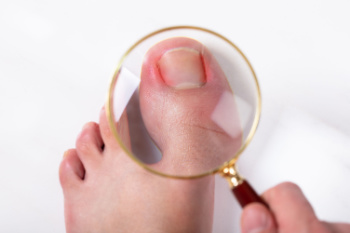
Ever had that annoying pain in your toe and wondered what was going on? You might be dealing with an ingrown toenail. This happens when the edges of your toenail start growing into the surrounding skin, causing pain, swelling, and even an infection. Ingrown toenails often occur on the big toe and can be triggered in several ways. One common cause is cutting your toenails too short. When you trim too close, the skin can fold over the nail, making it grow inward. Rounded or torn nails are also prone to becoming ingrown, since they do not grow back with clear corners. Wearing shoes that are too tight or too short can push the skin over the nail. Injuries or repetitive activities, like soccer kicks, can worsen the issue. Keep an eye out for pain, swelling, and redness surrounding the toenail. If your toe is causing you trouble and you suspect an ingrown toenail, it is suggested you schedule an appointment with a podiatrist.
Ingrown toenails can become painful if they are not treated properly. For more information about ingrown toenails, contact Robert Hutchison, DPM, FACFAS of Lower Keys Foot & Ankle Surgery. Our doctor can provide the care you need to keep you pain-free and on your feet.
Ingrown Toenails
Ingrown toenails occur when a toenail grows sideways into the bed of the nail, causing pain, swelling, and possibly infection.
Causes
- Bacterial infections
- Improper nail cutting such as cutting it too short or not straight across
- Trauma to the toe, such as stubbing, which causes the nail to grow back irregularly
- Ill-fitting shoes that bunch the toes too close together
- Genetic predisposition
Prevention
Because ingrown toenails are not something found outside of shoe-wearing cultures, going barefoot as often as possible will decrease the likeliness of developing ingrown toenails. Wearing proper fitting shoes and using proper cutting techniques will also help decrease your risk of developing ingrown toenails.
Treatment
Ingrown toenails are a very treatable foot condition. In minor cases, soaking the affected area in salt or antibacterial soaps will not only help with the ingrown nail itself, but also help prevent any infections from occurring. In more severe cases, surgery is an option. In either case, speaking to your podiatrist about this condition will help you get a better understanding of specific treatment options that are right for you.
If you have any questions please feel free to contact our office located in Key West, FL . We offer the newest diagnostic and treatment technologies for all your foot and ankle needs.
